“To Seek a Newer World”: Postcards from Ross Island, Antarctica
By Marissa Grunes
At the top of Observation Hill, seven hundred feet above my home for the past five months at McMurdo Station, Antarctica, stands a wooden cross. The air is so dry that the cross is clearly visible from town, silhouetted against the sky. It stands 9 feet tall, cemented into the rusty volcanic basalt of Ob Hill. Some folks in town climb Ob Hill almost every day. When they do, they can still read the faint, fine lettering on the cross:
IN MEMORIAM
CapT R.F. Scott R.N.
CapT L.L.C. Oates Ins. Drgs.
Petty Officer E. Evans R.N.
Dr. E.A. Wilson
Lt. H.R. Bowers R.L.M.
WHO DIED ON THE
RETURN FROM THE
SOUTH POLE MARCH
1912
TO STRIVE, TO SEEK
TO FIND
AND NOT TO
YIELD
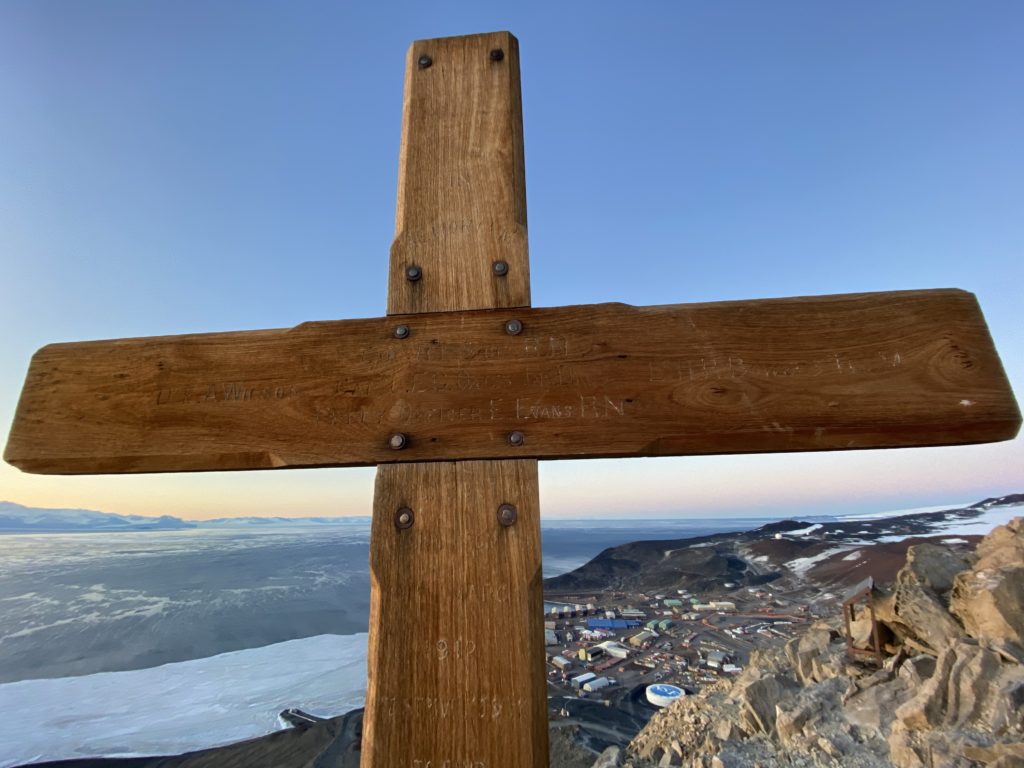
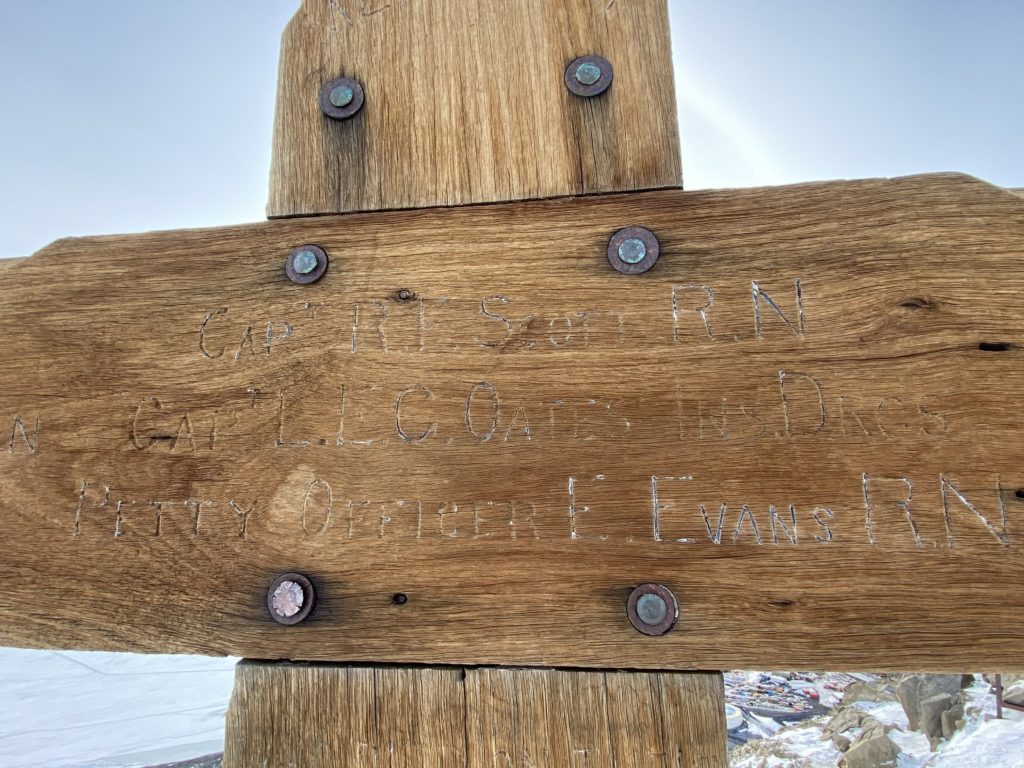
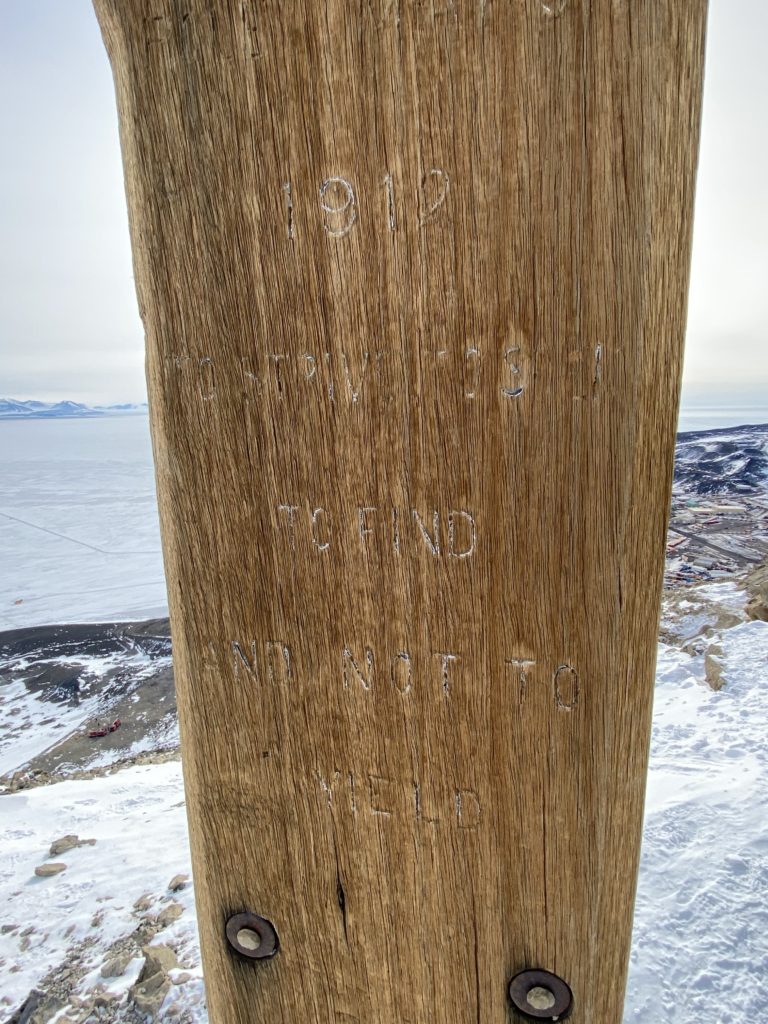
The cross, made of Australian jarrah eucalyptus, was erected to honor the men who perished with Captain Robert F. Scott on their way back from the South Pole in 1912. The inscription comes from the final line of Victorian poet Alfred Lord Tennyson’s poem “Ulysses.” It captures the relentless, driving spirit of the early Antarctic explorers. But it also represents a hidden lineage of poetry about Antarctica.
The quotation was chosen by Apsley Cherry-Garrard, who traveled to Antarctica in 1910 on the HMS Terra Nova under Captain Scott. “Cherry,” as he was affectionately called, was in his 20s, near-sighted, and a lover of poetry. In 1911, Cherry joined two men on a harrowing five-week trip through the Antarctic winter to find Emperor penguin eggs. The men traveled some 50 miles from Hut Point (a stone’s throw from my current home in McMurdo) to Cape Crozier, the easternmost point of Ross island, in unimaginably harsh conditions. They crossed crevasse fields in perpetual darkness, and encountered temperatures so cold that their clothing froze like armor within instants of leaving the tent. They barely slept and their “shivering bags” were lined with solid ice. Cherry’s two companions, Edward “Uncle Bill” Wilson and “Birdie” Bowers, survived the journey, only to perish with Scott on the Ross Ice Shelf the following year.
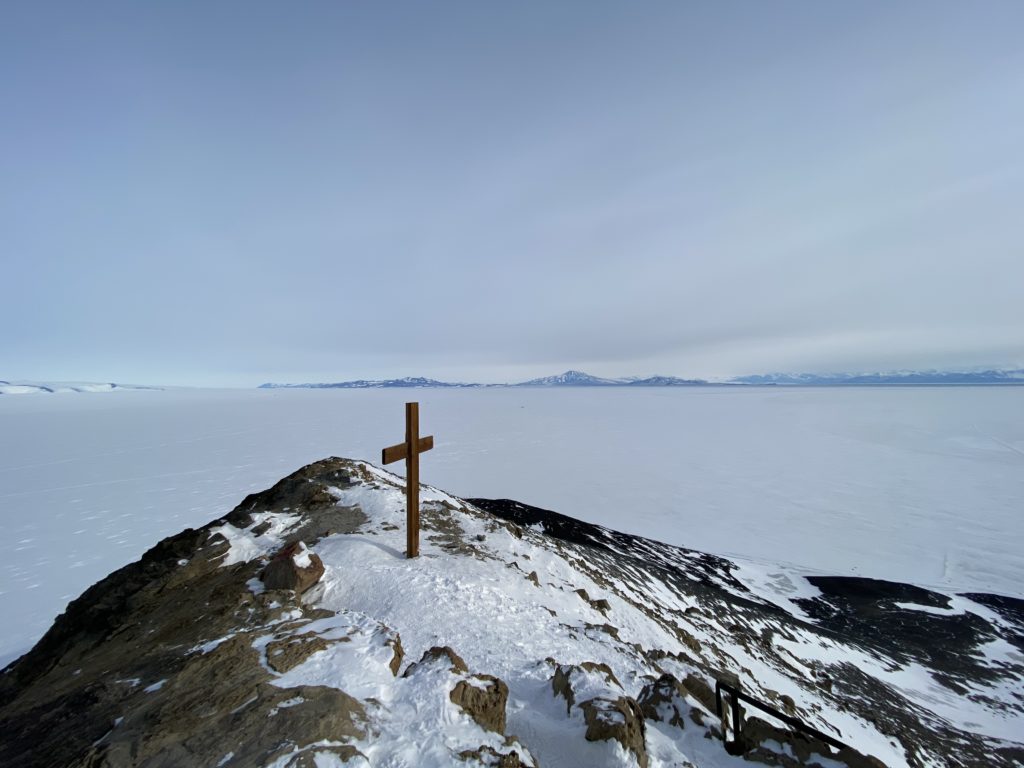
Cherry’s account of what he called “the worst journey in the world” repeatedly compares the Antarctic to Dante’s infernal regions. On one occasion, Cherry writes: “The temperature that night was -75.8°, and I will not pretend that it did not convince me that Dante was right when he placed the circles of ice below the circles of fire.”
Intriguingly, Dante’s Divine Comedy (c. 1314) features what some consider an early allusion to the Antarctic, the “unknown southern land” that had already been an object of speculation for centuries. In Book 26 of the Inferno, Dante meets the shade of Ulysses (or Odysseus), the Greek hero. The poet imagines Ulysses’s adventures after the events of Homer’s Odyssey. Safely at home with Penelope, Ulysses became restless. Nothing, he says,
“Could overcome within me the desire
I had to be experienced of the world.”
He sets sail again with the same crew that had followed him throughout the Odyssey, this time sailing west through the Pillars of Hercules, which mark the Strait of Gibraltar. According to legend, these stone pillars were inscribed with the words “ne plus ultra,” meaning “no more beyond.” Dante’s Ulysses ignores the warning and sails past these “landmarks set as signals, / That man no farther onward should adventure.” He continues west, but “evermore gaining on the larboard side,” drifting south. There he begins to see “all the stars of the other pole.” Eventually, he sights a mountain, possibly the site of Purgatory at the bottom of the world—but a whirlwind arises and strikes the ship before he can approach.
This is the same Ulysses we meet in Tennyson’s poem from 1842. By then, the words “ne plus ultra” had become woven into Antarctic legend. “Cook’s Ne Plus Ultra” referred to the southernmost Antarctic point reached in 1774 by Captain James Cook—who wrote that his “ambition leads me not only farther than any other man has been before me, but as far as I think it possible for man to go.”
For Antarctic explorers, Cook’s Ne Plus Ultra was the new Pillars of Hercules, and anyone sailing beyond it might take up the mantle of Ulysses.
In 1838, Lieutenant Charles Wilkes was instructed by the US Navy to sail “southward and westward as far as the Ne Plus Ultra of Cook”—a point navigators had been trying to reach for almost 70 years. He returned home with news of a seventh continent in 1842, the same year Tennyson published his poem. Just a year earlier, the legendary British explorer James Clark Ross had discovered Mount Erebus erupting on the Antarctic island that now bears his name—the same island that Scott would use as his base camp, that Cherry would explore in the dark winter…and on which I am currently living!
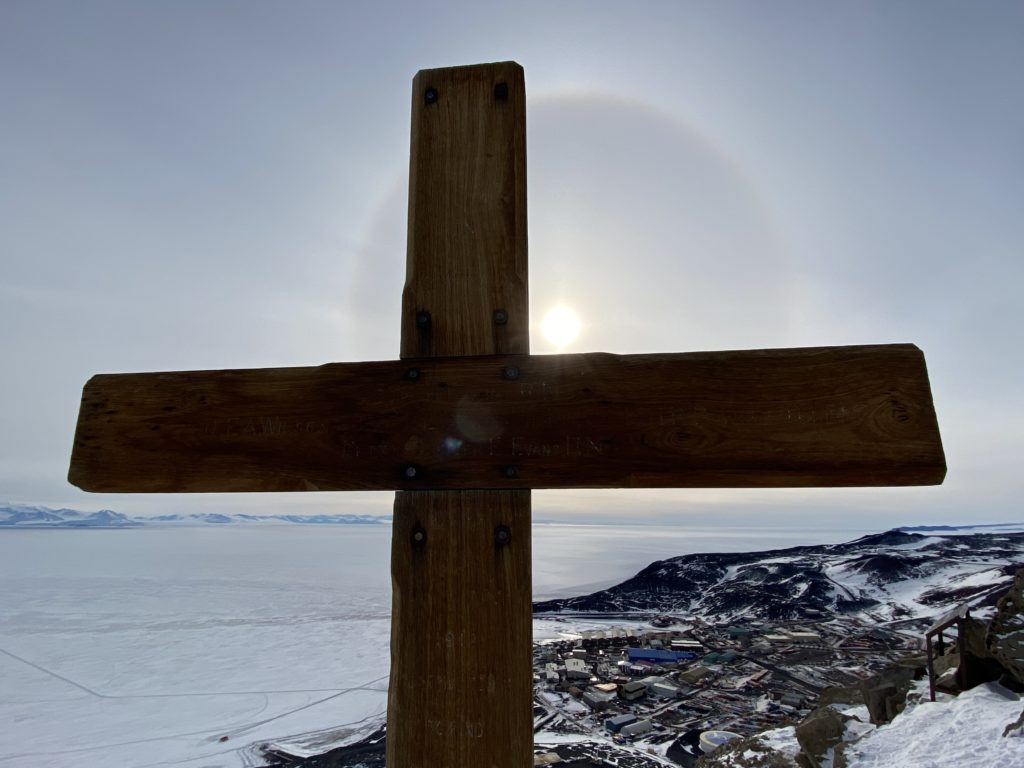
Tennyson thus published his poem when the fever pitch for Antarctic exploration was at an all-time high. His poem is a dramatic monologue, written from the perspective of Ulysses. Ulysses speaks of his “hungry heart” that “cannot rest from travel.” He wishes to “drink / Life to the lees” and be “honour’d of…all” he meets.
In his 1922 memoir, Cherry describes Scott in similar terms: a man hungry for discovery, who like Ulysses yearns “To follow knowledge like a sinking star, / Beyond the utmost bound of human thought.”
The band of men who followed Scott in 1910 must likewise have appreciated the loyalty of Ulysses’s crew. In a chapter on the polar journey that killed Scott, Cherry quotes Ulysses’s closing exhortation:
Come, my friends,
‘Tis not too late to seek a newer world.
Push off, and sitting well in order smite
The sounding furrows; for my purpose holds
To sail beyond the sunset, and the baths
Of all the western stars, until I die.
In 1910, what “newer world” could be farther beyond the bounds of human thought than the bitter, inhuman cold of the Antarctic?
Cherry wrote of Scott after his death:
“He will go down to history as the Englishman who conquered the South Pole and who died as fine a death as any man has had the honour to die. His triumphs are many —but the Pole was not by any means the greatest of them. Surely the greatest was that by which he conquered his weaker self, and became the strong leader whom we went to follow and came to love.”
It was Cherry who wished to memorialize Scott with Tennyson’s words. The men debated using a verse from the Bible, but Cherry wrote that he “was glad to see the concluding line of Tennyson’s “Ulysses” adopted: “To strive, to seek, to find, and not to yield.””
Today we live in heated buildings, can purchase aspirin and Emergen-C at the McMurdo store, and enjoy free pizza and cookies at the Galley. Yet we still live in the shadow of Ob Hill, a reminder of the spirit that—at some level—drew all of us here to this ice-covered volcanic island.
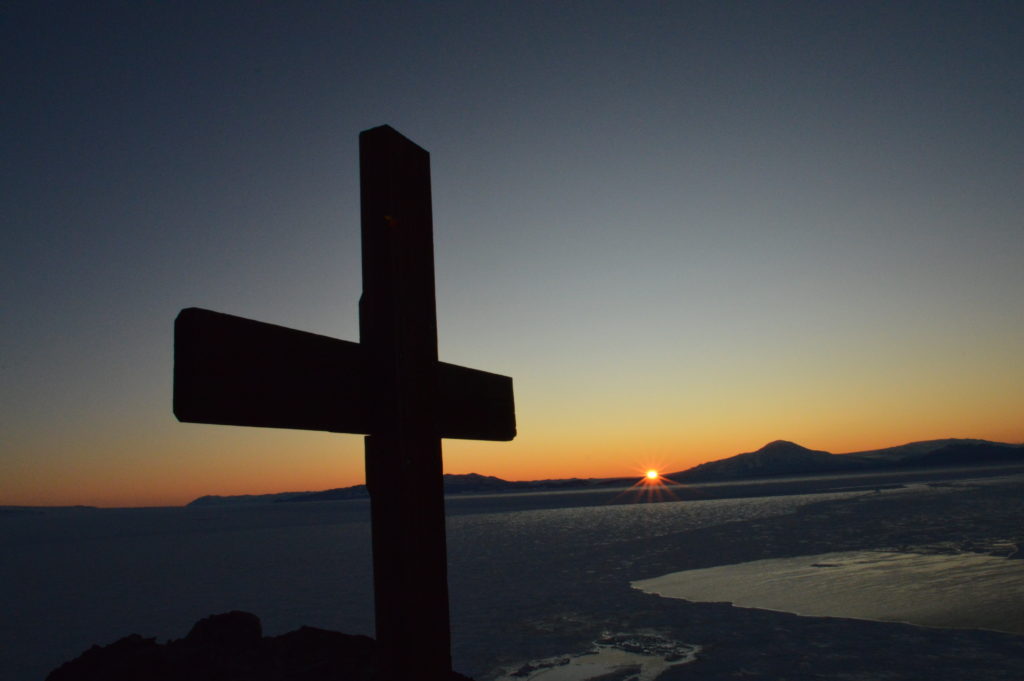
Towards the end of February, as I prepared to leave McMurdo, I climbed Ob Hill at midnight to watch one of the first sunsets of winter. As I crested the summit, the sun suddenly reappeared, as though it had changed its mind and decided to rise again. In its slow spiral down towards the west, it had passed behind a mountain and was reemerging for just a few minutes. The livid crescent of the setting sun shone along the face of the cross, illuminating the thin letters of its five names, the year, and Tennyson’s words—the only thing still easily legible. It seemed Antarctica’s way of honoring those men who fell in love with its grandeur and ferocity, and tested themselves to the utmost on the keen edge of its ice.
